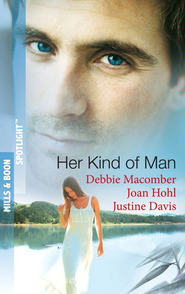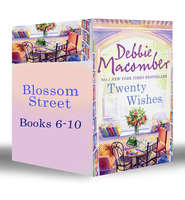По всем вопросам обращайтесь на: info@litportal.ru
(©) 2003-2024.
✖
Summer Wedding Bells: Marriage Wanted / Lone Star Lovin'
Автор
Год написания книги
2018
Настройки чтения
Размер шрифта
Высота строк
Поля
Savannah resisted the urge to roll her eyes. Rejecting marriage made as much sense to her as pushing a car over a cliff because the fender was dented. Instead she asked, “Is this what you want Susan and Kurt to do? Live together indefinitely? Without commitment?”
That gave him pause. Apparently it was perfectly fine for other couples to do that, but when it came to his little sister, he hesitated. “Yes,” he finally said. “Until this infatuation passes.”
“What about children?”
“Susan’s little more than a child herself,” he argued, although she was twenty-four—and in Savannah’s estimation a mature twenty-four. “If she’s smart, she’ll avoid adding to her mistakes,” he said stiffly.
“What about someone other than your sister?” she demanded, annoyed with herself for allowing him to draw her into this pointless discussion. “Are you suggesting our society should do away with family?”
“A wedding ring doesn’t make a family,” he returned just as heatedly.
Savannah sighed deeply. “I think it’s best for us to agree to disagree,” she said, feeling a bit sad. It was unrealistic to think she’d say anything that would change his mind. Susan was determined to marry Kurt, with or without his approval, but she loved her brother, too. That was what made this situation so difficult.
“Love is a lame excuse to mess up one’s life,” he said, clenching his fists at his side with impotent anger. “A lame excuse.”
At his third use of the word lame, Savannah inwardly flinched. Because she was sitting behind her desk, he didn’t realize she was “lame.”
“Marriage is an expensive trap that destroys a man’s soul,” Nash went on to say, ignoring her. “I see the results of it each and every day. Just this afternoon, I was in court for a settlement hearing that was so nasty the judge had to pull both attorneys into chambers. Do you really believe I want my little sister involved in something like that?”
“Your sister is a grown woman, Mr. Davenport. She’s old enough to make her own decisions.”
“Mistakes, you mean.”
Savannah sensed his frustration, but arguing with him would do no good at all. “Susan’s in love. You should know by now that she’s determined to marry Kurt.”
“In love. Excuses don’t get much worse than that.”
Savannah had had enough. She stood and realized for the first time how tall Nash actually was. He loomed head and shoulders over her five-foot-three-inch frame. Standing next to him she felt small and insignificant. For all their differences, Savannah could appreciate his concerns. Nash loved his sister; otherwise he wouldn’t have gone to such effort to find out her plans.
“It’s been interesting,” Nash said, waiting for her to walk around her desk and join him. Savannah did, limping as she went. She was halfway across the room before she saw that he wasn’t following her. Half turning around, she noticed that he was looking at her leg, his features marked by regret.
“I didn’t mean to be rude,” he said, and she couldn’t doubt his sincerity. What surprised her was his sensitivity. She might have judged this man too harshly. His attitude had irritated her, but she’d also been entertained by him—and by the vigor of their argument.
“You didn’t know.” She finished her trek to the door, again surprised to realize he hadn’t followed her. “It’s well past my closing time,” she said meaningfully.
“Of course.” His steps were crisp and uniform as he marched across her shop, stopping abruptly when he reached her. A frown wrinkled his brow as he stared at her again.
“What’s wrong?”
He laughed shortly. “I’m trying to figure something out.”
“If it has to do with Susan and Kurt—”
“It doesn’t,” he cut in. “It has to do with you.” An odd smile lifted his mouth. “I like you. You’re impertinent, sassy and stubborn.”
“Oh, really!” She might have been offended if she hadn’t been struggling so hard not to laugh.
“Really.”
“You’re tactless, irritating and overpowering,” she responded.
His grin was transformed into a full-blown smile. “You’re right. It’s a shame, though.”
“A shame? What are you talking about?”
“You being a wedding coordinator. It’s a waste. With your obvious organizational skills, you might’ve done something useful. Instead, your head’s stuck in the clouds and you’ve let love and romance fog up your brain. But you know what?” He rubbed the side of his jaw. “There just might be hope for you.”
“Hope. Funny, I was thinking the same thing about you. There just might be a slim chance of reasoning with you. You’re clearly intelligent and even a little witty. But unfortunately you’re misguided. Now that you’re dealing with your sister’s marriage, however, there’s a remote possibility someone might be able to get through to you.”
“What do you mean?” he asked, folding his arms over his chest and resting his weight on one foot.
“Your judgment’s been confused by your clients. By their anger and bitterness and separations. We’re at opposite ends of the same subject. I work with couples when they’re deeply in love and convinced the relationship will last forever. You see them when they’re embittered and disillusioned. But what you don’t seem to realize is that you need to see the glass as half-full and not half-empty.”
He frowned. “I thought we were talking about marriage.”
“We are. What you said earlier is true. Fifty percent of all married couples end up divorcing—which means fifty percent of them go on to lead fulfilling, happy lives.”
Nash’s snort was derisive. He dropped his arms and straightened, shaking his head. “I was wrong. There’s no hope for you. The fifty percent who stay together are just as miserable. Given the opportunity, they’d gladly get out of the relationship.”
Nash was beginning to irritate her again. “Why is it so difficult for you to believe that there’s such a thing as a happy marriage?”
“Because I’ve never seen one.”
“You haven’t looked hard enough.”
“Have you ever stopped to think that your head’s so muddled with hearts and flowers and happy-ever-afters that you can’t and won’t accept what’s right in front of your eyes?”
“Like I said, it’s past my closing time.” Savannah jerked open the shop door. The clanging bell marked the end of their frustrating conversation. Rarely had Savannah allowed anyone to get under her skin the way she had Nash Davenport. The man was impossible. Totally unreasonable…
The woman was impossible. Totally unreasonable.
Nash couldn’t understand why he continued to mull over their conversation. Twenty-four hours had passed, and he’d thought about their verbal sparring match a dozen times.
Relaxing in his leather office chair, he rolled a pen between his palms. Obviously Savannah didn’t know him well; otherwise, she wouldn’t have attempted to convince him of the error of his views.
His eyes fell on the phone and he sighed inwardly. Susan was being stubborn and irrational. It was plain that he was going to have to be the one to mend fences. He’d hoped she’d come to her senses, but it wasn’t going to happen. He was her older brother, her closest relative, and if she refused to make the first move, he’d have to do it.
He looked up Kurt Caldwell’s parents’ phone number. He resented having to contact her there. Luck was with him, however, when Susan herself answered.
“It’s Nash,” he said. When she was little, her voice rose with excitement whenever he called. Anytime he arrived home, she’d fly into his arms, so glad to see him she couldn’t hold still. He sighed again, missing the child she once was.
“Hello, Nash,” Susan said stiffly. No pleasure at hearing from him was evident now.
“How are you doing?” That was the purpose of this call, after all.
“Fine. How about you?” Her words were stilted, and her stubbornness hadn’t budged an inch. He would have said as much, then thought better of it.
“I’m fine, too,” he answered.











